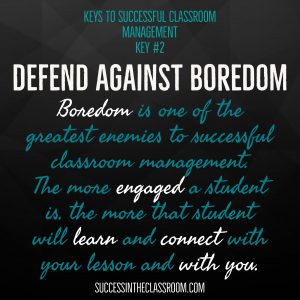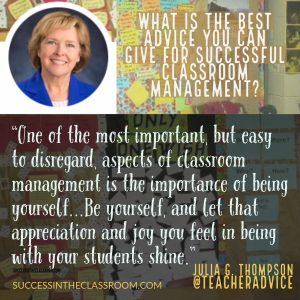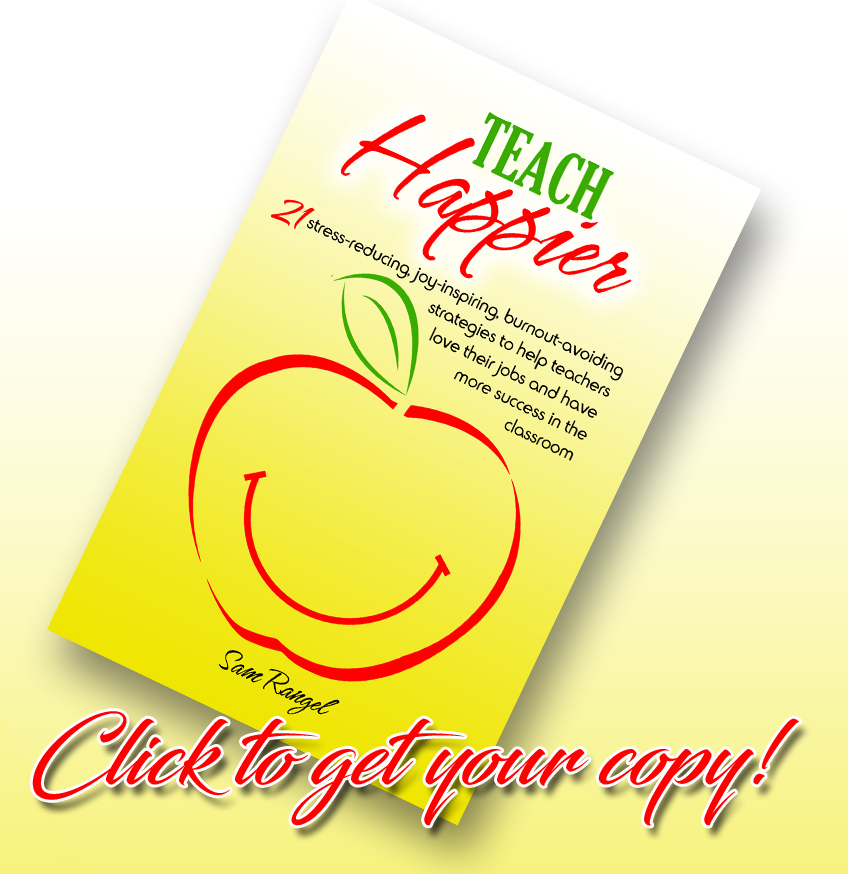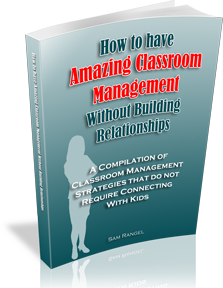This is the second installment in the series that I call Keys to Successful Classroom Management. In the last installment, I shared the first Key: Build Positive Relationships.
In this post, I share the second key: Defend Against Boredom.
Boredom is one of the greatest enemies to successful classroom management. The more engaged a student is, the more that student will learn and connect with your lesson and with you. Creating that engaging lesson plan, however, is not easy. Boring is easy. Boring doesn’t take a lot of effort.
In my experience in the classroom, the days when I had the most problems with management were when my days when my lessons were thrown together at the last minute. You can’t create interesting lessons at the last minute.
Kids hate boring lessons.
Ask any teacher who has been doing this for any length of time, and they’ll tell you that when kids are bored, some will sit quietly and tune out, while others will look for ways to get un-bored, and most of the time, it will by doing something that will disrupt your lesson and the class.
Something that I learned a long time ago was that an engaged student is not a behavior problem.
I like what teacher and author, Doug Robertson shared with me recently when I asked him about classroom management.
“Accept that students aren’t there to be managed, and by keeping them engaged, interested and forward moving, they’ll do most of that work for you.” Doug Robertson @TheWeirdTeacher

Different Opinions of Interesting
Keeping students engaged is the goal of the successful lesson plan, but this is not as easy as it appears, especially if you and your students have different opinions of what is interesting.
One important lesson that I learned early on in my teaching career was that just because the topic was interesting to me, didn’t mean that it would be interesting to my students. In fact, I learned to assume that the concept that I was trying to teach my students was NOT going to be interesting to them. That forced me to be more creative and find ways to inject something that would make the topic more attractive to my kids. As it turned out, that became the best part of my lesson planning. I loved looking for new ways of teaching an old topic.
Textbook Lessons are Boring.
As a new teacher, I felt obliged to use the lessons in the textbook. I know that a lot of new teachers feel the same way. Unfortunately, the lessons in the textbook are created for the “typical” student. You don’t have typical students. Right? I know I didn’t, and I found that I struggled with kids being bored in my class, because, well, the lessons in the textbook were boring.
Everything changed when I started ignoring the textbook. Yes, I said it. I ignored the textbook. I began creating my own lessons, and used the book only as a resource.
I began to incorporate my own personality, my passions, and most importantly – my stories. I would connect the concept to a personal story of mine, and I was able to keep the kids from getting bored, and as a result, my classroom management began to improve.
It’s OK to personalize the lesson. I really like what author and speaker, Julia G. Thompson shared with me recently:
“One of the most important, but easy to disregard, aspects of classroom management is the importance of being yourself. Teachers who try to follow the management systems and advice of others, even their colleagues with well-run classrooms, without factoring their own strengths and areas in need of improvement are likely to be frustrated and ineffective.
Take some time to figure out your strengths as a classroom leader. Are you good at settling in students at the start of class? Are you comfortable with productive noise? Do you have solid back up plans? Do you know your students well? Can you make a difficult phone call home when things go wrong into a productive experience? What do you do well? Do more of that. Not only will you be more comfortable with yourself, your increased confidence will allow you to connect with your students and to act quickly to minimize or prevent problems once they occur.
Do follow school rules. Do consult other teachers and staff mem bers. Learn from everyone around you, then manage your classroom with the authentic voice that is yours. Be yourself, and let that appreciation and joy you feel in being with your students shine.” Julia G. Thompson @TeacherAdvice
bers. Learn from everyone around you, then manage your classroom with the authentic voice that is yours. Be yourself, and let that appreciation and joy you feel in being with your students shine.” Julia G. Thompson @TeacherAdvice
Following this particular key requires some time and effort. You’ll have to make the decision to walk away from the textbook’s suggested lessons, and start thinking like a kid. You’ll have to come to the realization, like I did, that just because the topic is interesting to you, it may not impress your kids that much.
I would encourage you to consider the question, “Is this boring to the kids?” the next time you plan your lesson. In fact, I would consider that student in your class who causes the most disruption, and ask the question, “Is this boring to ____?”
Don’t let boredom keep you from having that impact on the students in your class that you want to have. Your students need you to create exciting and engaging lesson plans.
Click to download my free PDF: 7 Ways to Keep Boredom Out of Your Classroom.
I hope you found this post helpful. If you did, please share using the Social Media icons below. Stay tuned for the next installment of this series. Even better, sign up to for the SITC Newsletter and get notified by email when it’s posted. Click here!
Don’t forget to check out my book, Teach Happier – 21 stress-reducing, joy-inspiring, burnout-avoiding strategies to help teachers love their jobs and have more success in the classroom.
Until next time, here’s to your Success in the Classroom!
Thank you,
Sam



